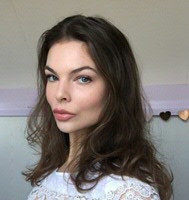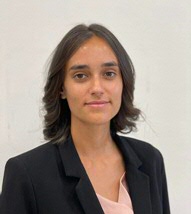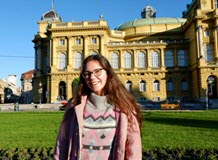Studying Russian within European Languages and Cultures
If you choose Russian as a specialization within ELC, you will have to be motivated and willing to study hard and intensively – but you will get a lot in return . After the beginning of Russia’s full-scale war in Ukraine in 2022, learning the Russian language, culture and politics has become a much more serious matter. Taking these courses will provide you with insights into the developments that may have contributed to the war as well as perspectives on current social processes. The combination of a variety of knowledge domains and language proficiency will enable you to explore multiple aspects of Russia and other post-Soviet societies .
Does Russian even belong to European Languages and Cultures? Russian is considered part of the Slavic language group, which includes languages such as Polish, Czech, and Serbian. It is spoken by more than 250 million people worldwide, making it the eighth most spoken language in the world and one of the six official UN languages. Similar to other large European empires, Russia has played an important role in global history, often having a major impact on the people and territories that it subjugated. By studying the Russian language and culture, we can also better understand the ways in which imperialism and colonialism have shaped Russian identity and society. Additionally, by learning the Russian language, we can engage in critical analysis and dialogue, and work towards a deeper understanding of the complex legacies of the Russian empire in local and global contexts.
Why Russian?
If you are interested in Russian history, politics and culture, the Russian specialization within European Languages and Cultures may be just the thing for you. It will teach you how to place the Russian language, culture, literature and politics in a wider context.
The Russian proficiency course units start in the first semester of your first year and this is where the hard work begins. You will have to study vocabulary, practice pronunciation, learn to use six grammatical cases and get used to a new system of verbs. This is not going to be easy, but your efforts will be rewarded by a growing understanding of the language and culture. During the first two years you will develop your language skills, learn to communicate in the target language and work with authentic materials.
In the second and third year, you will follow 4 language specific courses focused on Russian politics, literature and language as well as an interdisciplinary course which will introduce you to the concepts and approaches of memory studies. In these courses, you will discuss the most significant development in Russian politics after the fall of the Soviet Union, including the wars in Chechnya, Russian-American relations, Russia’s war on Ukraine and the repressive conservative turn in domestic politics. You will read Russian prose and poetry in the original and explore the societal importance of literature in Russia. The focus of reading Russohpone literature will be on how it shapes national and transnational identities and imperial as well as anti-imperial visions.
Our program includes films, the latest news, music, literature, and social media – next to more traditional texts. During your third year you will have a chance to spend a semester abroad, and this is where you will continue to work on your language skills and expand your knowledge about the region. The University of Groningen has contacts with universities in various countries of Eastern Europe and Eurasia.
Depending on your interests, the specialization and profile choices you make in your Bachelor’s programme and your follow-on Master’s degree programme, your degree in Russian could, for example, qualify you to become a journalist or find a career in academic research, at an international governmental organization or an NGO. Other graduates have found jobs in the diplomatic world or taken additional training to become translators or interpreters. Our alumnus of the Year 2022 is Iris de Graaf, Russia correspondent for Dutch news broadcaster NOS, who studied Slavonic Languages and Russian Studies in Groningen.
Lecturers:
Alsu Buiting (Language proficiency)
Dina De Vries-Zhuravleva (Language proficiency)
Lisa Gaufman (Russian discourse and politics)
Ksenia Robbe (Russian culture and literature)


Astrid Wieles – Student of ELC Russian
The main reason why I chose to study ELC was because of my greatest wish: learning Russian. This goal has definitely been met, though it has been very difficult at times. It requires a lot of work and dedication, but it is so incredibly worthwhile. And of course the other subjects inherent to this program, such as (Russian) politics, literature, and culture, had my interest as well. I chose Politics and Society as my main profile, and Central- and East-European Studies as my elective. I think this combination taught me so many valuable things about the post-Soviet area – gaining a deep understanding of the history and the culture made me understand the processes which are observable today – and I could not have wished for anything more. The teachers of all the Russian language courses are absolutely great, they are so particularly skillful at their job, they have a lot of knowledge, are always open for discussions and questions, and will always try to help you the best they can. In addition, this program motivated me to continue studying the post-Soviet space during my masters, and I believe with ELC Russian, I have built up a significant amount of knowledge to do so successfully.

Micol Manunta – Student of ELC Russian
I completed the ELC Bachelor two years ago and I have fond memories of the thriving learning environment and the genuine care of the professors of the Russian classes. Learning Russian was rather challenging but at the same deeply rewarding. In 2019, I had the opportunity to follow a semester at the Saint Petersburg State University, Faculty of International Relations and Political Science. Simultaneously, I kept following a RUG Russian language module with which our professor kept in touch and checked regularly on our progress, as well as our personal situation. It was an unforgettable experience that impacted positively both my personal and academic growth.
Learning Russian was more than being able to speak it: throughout the whole programme, we thoroughly explored political and literary elements of the Russian tradition. Most importantly we did so in an interdisciplinary manner which allowed me to gain valuable research skills that I could hone during my Master.
After completing ELC, I started the Research Master Cultural Leadership. Throughout the programme, I had the chance to follow courses as well from the Russian track of the master European Literature and Interculturality. Such a combination of programmes enabled me to keep studying and researching the collective memory of the 20th century Russia.

Magdalene Blincoe-Deval
As someone who enjoys traveling, living in different countries, experiencing various cultures, and learning foreign languages, ELC seemed like a programme that was designed for me. The only thing I was certain about before starting the programme was that I wanted to study Russian as my major language. I have just completed my first year and have thoroughly enjoyed the Russian language seminars in particular. I chose Culture and Literature as my profile, and Spanish as my elective.
Although Russian is the most difficult language I have learned so far, it is also the most rewarding, and the seminars really brought the mounds of complicated grammar to life. I have lived and traveled around Russia and other countries where Russian is spoken, and can concur (as just about any student of Russian language) that the grammar is the most challenging aspect. As it is such a difficult language, there is a real sense of comradery within the classes which is valuable when the difficulty level increases! The Russian language teaching team offers a lot of cultural insights, and our seminars often diverge into interesting discussions in which we look at cultural and political aspects.
| Last modified: | 27 January 2025 3.14 p.m. |
